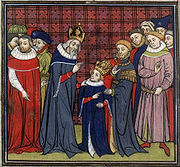
Li coronemenz Looïs
Encyclopedia

Old French
Old French was the Romance dialect continuum spoken in territories that span roughly the northern half of modern France and parts of modern Belgium and Switzerland from the 9th century to the 14th century...
chanson de geste
Chanson de geste
The chansons de geste, Old French for "songs of heroic deeds", are the epic poems that appear at the dawn of French literature. The earliest known examples date from the late eleventh and early twelfth centuries, nearly a hundred years before the emergence of the lyric poetry of the trouvères and...
. It is sometimes attributed to Bertrand de Bar-sur-Aube
Bertrand de Bar-sur-Aube
Bertrand de Bar-sur-Aube was an Old French poet from the Champagne region of France who wrote a number of chansons de geste. He is the author of Girard de Vienne, and it is likely that he also wrote Aymeri de Narbonne...
and dated 1137. The first modern critical edition of the text was published in 1888 by Ernest Langlois under the title Le Couronnement de Louis.
The chanson is, as its title indicates, about the coronation
Coronation
A coronation is a ceremony marking the formal investiture of a monarch and/or their consort with regal power, usually involving the placement of a crown upon their head and the presentation of other items of regalia...
of Louis the Pious
Louis the Pious
Louis the Pious , also called the Fair, and the Debonaire, was the King of Aquitaine from 781. He was also King of the Franks and co-Emperor with his father, Charlemagne, from 813...
, son of Charlemagne
Charlemagne
Charlemagne was King of the Franks from 768 and Emperor of the Romans from 800 to his death in 814. He expanded the Frankish kingdom into an empire that incorporated much of Western and Central Europe. During his reign, he conquered Italy and was crowned by Pope Leo III on 25 December 800...
. The story begins with the aging emperor preparing to abdicate the throne to his fifteen-year-old son. Louis is hesitant in the face of the enormous responsibilities that attend the wearing of the crown. When the emperor dies, to the spontaneous ringing of bells, Arnéïs d'Orléans assumes the reins of government
Regent
A regent, from the Latin regens "one who reigns", is a person selected to act as head of state because the ruler is a minor, not present, or debilitated. Currently there are only two ruling Regencies in the world, sovereign Liechtenstein and the Malaysian constitutive state of Terengganu...
until the young prince has come of age; Louis meanwhile abides at the court of Guillaume d'Orange.
Guillaume soon embarks on a pilgrimage
Pilgrimage
A pilgrimage is a journey or search of great moral or spiritual significance. Typically, it is a journey to a shrine or other location of importance to a person's beliefs and faith...
to Rome
Rome
Rome is the capital of Italy and the country's largest and most populated city and comune, with over 2.7 million residents in . The city is located in the central-western portion of the Italian Peninsula, on the Tiber River within the Lazio region of Italy.Rome's history spans two and a half...
with the young Louis and there they find the city besieged by Saracens. Guillaume challenges a Saracen champion
Champion
A champion is the victor in a challenge, contest or competition.There can be a territorial pyramid of championships, e.g. local, regional / provincial, state, national, continental and world championships, and even further divisions at one or more of these levels, as in soccer. Their champions...
to single combat and decisively defeats him, becoming a champion of the Pope
Pope
The Pope is the Bishop of Rome, a position that makes him the leader of the worldwide Catholic Church . In the Catholic Church, the Pope is regarded as the successor of Saint Peter, the Apostle...
and the saviour of Rome in the process. He has lost, however, the tip of his nose, from the Saracen's sword, and is thenceforth known by the sobriquet Guillaume au court nez: Guillaume of the short nose.
This early chanson is highly historical in character. Its description of Charlemagne is gleaned largely from the entry for the year 813 in the Vita Hludowici. As it was composed during the reign of Louis VII of France
Louis VII of France
Louis VII was King of France, the son and successor of Louis VI . He ruled from 1137 until his death. He was a member of the House of Capet. His reign was dominated by feudal struggles , and saw the beginning of the long rivalry between France and England...
, who was for most of his life without a male heir, the politics behind the story's strong emphasis on the hereditary nature of kingship is partial to the Capetian
Capetian
Capetian is an adjective, used to describe either:* The House of Capet, also called the Direct Capetians – the ruling family of France between 987 and 1328* The Capetian dynasty, a term applied to all direct descendants of Hugh Capet...
.

